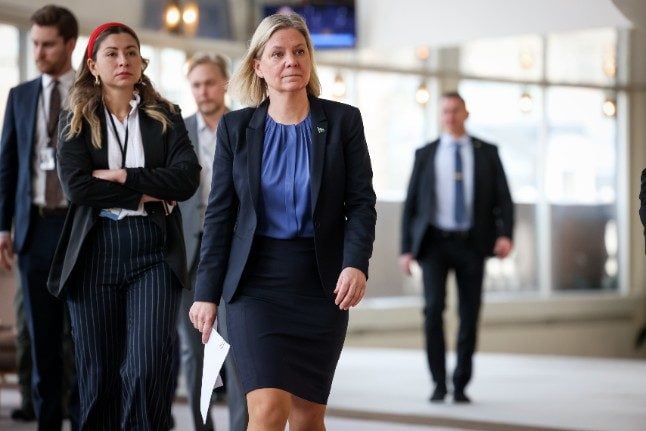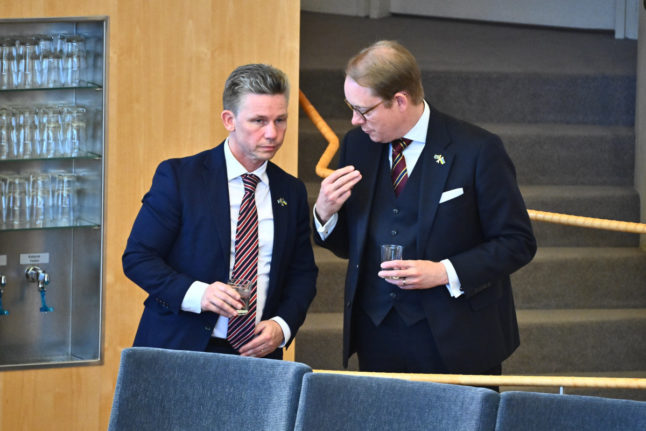Stockholm and Helsinki have ruled out applying to join the Nato military alliance for the time being but the two countries have never been so close to taking the plunge, analysts say.
“Anything is possible at the moment and the signal from Nato countries is that a membership application can be processed in a very short time span,” said Zebulon Carlander, defence analyst with the Society and Defence organisation in Sweden.
“So I think it’s very much a political decision that rests in the capitals — Stockholm and Helsinki,” he told AFP.
The two countries are officially non-aligned, although they have been Nato partners since the mid-1990s and ended their neutral stance at the end of the Cold War.
Finland’s parliament is due on Tuesday afternoon to consider how to respond to a public petition calling for a referendum on Nato membership.
The citizen’s petition garnered the 50,000 signatures needed to refer the matter to the Eduskunta in less than a week.
It will be considered by lawmakers as part of a wider debate on the crisis in Ukraine.
And although Prime Minister Sanna Marin tweeted on Monday that the debate was not intended as a “wider conversation on Finland’s policy regarding military alignment or non-alignment”, the context of the discussion has suddenly changed.
For the first time, a majority (53 percent) of Finns are in favour of joining the Atlantic alliance, according to a poll published on Monday by public broadcaster Yle.
This is almost double the number a month ago, when a survey in the Helsingin Sanomat newspaper put support for NATO membership at just 28 percent.
“(This is) a completely historic and exceptional result,” Charly Salonius-Pasternak, senior research fellow at Finnish Institute of
International Affairs, told AFP.
Support for joining Nato is historically high in Sweden too — at 41 percent, according to a poll by public broadcaster SVT last Friday.
Russian warnings
In another radical change, the two countries have broken with tradition by exporting weapons to a country in active conflict.
In addition to sending Ukraine protective equipment, including helmets and body armour, Stockholm is to deliver 5,000 anti-tank weapons.
This is an “exceptional” move, stressed Prime Minister Magdalena Andersson, unprecedented since the Winter War of 1939, when Sweden sent assistance to Finland to counter an invasion by none other than the Soviet Union.
“I think this is probably just the beginning of reassessments in Swedish defence security policy,” Carlander said. “And we are also seeing a debate now on what further measures could be taken to strengthen the Swedish armed forces.”
In another “historic decision”, in the words of Sanna Marin, Finland on Monday also agreed to send weapons to Ukraine, including 2,500 assault rifles, ammunition and 1,500 single-use anti-tank weapons.
In parallel, the Swedish and Finnish army reserves are reporting an increase in applications.
Nato membership for Finland and/or Sweden — experts expect the two countries to act in concert — would infuriate the Kremlin at a time when tensions between Russia and the West are already explosive.
The eastward expansion of Nato is a red line for Moscow, which has felt betrayed by the West on this subject since the end of the Cold War.
Last Friday, Russia’s foreign ministry warned that if the Nordic countries were to join Nato it would “have serious military and political repercussions”.
Helsinki shrugged this off as a warning it had heard before, which did not amount to a threat of invasion.
Stockholm and Helsinki continue officially to rule out membership bids. Yet, crucially, they have in recent weeks taken steps to ensure that the door to the alliance — and its key Article 5 on collective defence — remains open to them.



 Please whitelist us to continue reading.
Please whitelist us to continue reading.
Member comments